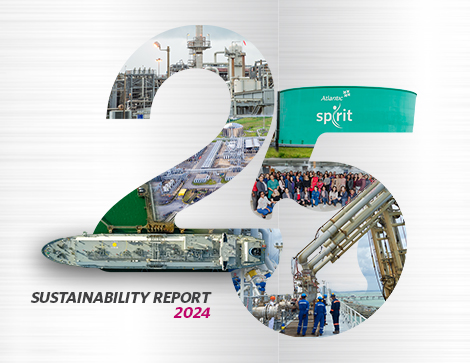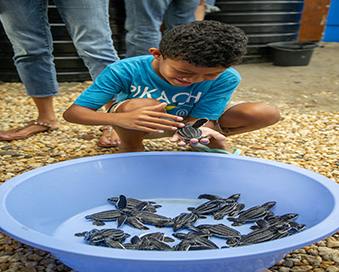Journeying from as far as Point Fortin, Atlantic staff recently travelled to Grande Riviere to participate in the company’s continuing conservation efforts for the vulnerable leatherback turtle and other species. Hundreds of hatchlings were released into the ocean at dusk to protect them from daytime predation.
Among those present were Atlantic’s CEO Dr. Philip Mshelbila, demonstrating the company’s continued commitment to supporting the work of those who safeguard the turtles and preserving the ability for future generations to have the experience.
For the past few years, Atlantic has partnered with the Turtle Village Trust (TVT) on several initiatives in aid of the preservation of the sea turtles at various life stages: nesting, hatching and migratory patterns. One such project allows for information to be gathered on the Trinidad and Tobago’s nesting turtle populations. Last season, there were over 15,000 recorded turtle nesting events on 44 beaches over 184 days of monitoring effort.
The Geo-Tagging project, launched in 2016, uses satellite telemetry to track the migratory patterns of hard-shell turtles. Atlantic also sponsors the Nest Relocation and Hatchery Programme – a programme developed to impede threats to the natural nesting conditions of the turtles. There are plans underway to introduce a self-sustaining project that will produce crayfish to efficiently produce food for the Turtle Hatchery. All of these initiatives are geared towards increasing the 1 to 1000 chance of survival to adulthood, for these precious creatures.
Len Peters, Chairman – Grande Riviere Nature Tour Guides Association gave insight into the dangers the leatherback turtles face that led to the vulnerable species listing. “Leatherbacks are most vulnerable to predation in their early life stages. There are threats while the eggs are in the sand, when the hatchlings scramble to the sea and once they enter the sea,” said Mr. Peters. “Conservationists across the country understand the benefit of helping them with their journey to the water; it is as much as we can assist. The turtle conservation programmes are also helping to change the mentality of the local community,” he continued. “People are seeing the benefits that the turtles can bring to the community through economic growth, and are becoming more involved in the conservation efforts.”
This year, the Atlantic turtle watching trip gave employees, and by extension their families, another opportunity to experience the beauty of the turtles first-hand and to appreciate their role as advocates for this important cause.



